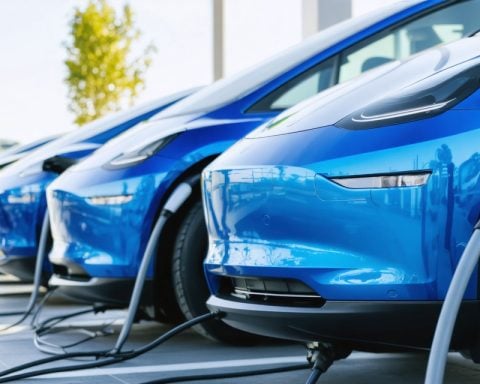- Aspen Aerogel Inc. canceled its plans for a 500,000-square-foot manufacturing facility in Georgia, shifting focus to its existing Rhode Island plant.
- This decision highlights a slowdown in electric vehicle demand, influenced by recent policy changes, including the repeal of the $5-billion EV charger program by the Trump administration.
- The company aims to enhance capacity by redeploying equipment, adjusting to the evolving industry landscape with strategic agility.
- The move signals a broader trend towards adaptation and foresight as companies navigate unpredictable markets.
- Aspen Aerogel’s decision parallels Freyr Battery’s withdrawal of a $2.6-billion plant project in Georgia, underscoring the importance of agility for success in the innovation-driven era.
A spark of innovation flickered out in Statesboro, Georgia, as Aspen Aerogel Inc. unexpectedly scrapped plans for a major manufacturing facility. The Northborough, Massachusetts-based company had envisioned a sprawling 500,000-square-foot plant, designed to produce cutting-edge thermal barriers for electric vehicle batteries. Instead, it has chosen a different path, pivoting to maximize the potential of its existing plant in Rhode Island.
This strategic redirection casts a spotlight on a shifting landscape. As winds of change sweep across the industry, automakers are confronting a slowdown in electric vehicle demand—an echo of shifting political tides. In a dramatic move, the Trump administration rolled back Biden-era policies that once championed the rise of electric vehicles. Gone is the $5-billion boost for nationwide EV chargers, a program now left suspended.
CEO Donald Young speaks of navigating this evolving environment with a keen eye. Aspen Aerogel isn’t retreating but recalibrating, choosing to bolster its capacity where it counts most. By redeploying equipment from the Georgia site, the company aims to enhance its operational prowess back home in East Providence. The move reflects a broader trend of strategic agility, a hallmark of companies nimble enough to thrive amid unpredictability.
This isn’t an isolated decision. The cancellation follows another significant withdrawal—a $2.6-billion plant project by Freyr Battery in Georgia. These reversals serve as a reminder: in an era of ambitious innovation, adaptation remains key. As markets realign and priorities shift, the companies that succeed will be those that can master both the art of foresight and the skill of rapid response.
A Twist in the Tale: Why Aspen Aerogel’s Pivot Spotlights Key Trends in the EV Industry
Impact of Aspen Aerogel’s Decision on the EV Industry
Aspen Aerogel’s decision to halt the construction of its planned manufacturing facility in Georgia highlights the shifting currents in the electric vehicle (EV) industry. It’s a reflection of how external factors, including policy changes and market dynamics, are influencing company strategies.
Real-World Use Cases and Industry Trends
1. Streamlined Operations: By consolidating operations at its Rhode Island plant, Aspen Aerogel is likely optimizing resource allocation. This is a common strategy for companies seeking efficiency in uncertain market conditions. Other industries could learn from this approach to better manage costs and improve their production capabilities.
2. Response to Policy Shifts: The move away from expanding EV infrastructure happens in the context of changing political landscapes, notably the rollback of policies aimed at promoting EV adoption. According to the International Energy Agency, policy support plays a crucial role in maintaining EV market growth. Companies like Aspen Aerogel must adapt quickly to these changes, ensuring they remain competitive.
Market Forecasts
Industry experts predict that, despite short-term challenges, the EV market is set to continue growing, driven by global demands for sustainable transport. BloombergNEF projects that sales of EVs could reach 10 million units annually by the mid-2020s. This growth will require consistent innovation and efficiency improvements from suppliers like Aspen Aerogel.
Features, Specs & Pricing in Thermal Barriers
Aspen Aerogel specializes in developing high-performance aerogels, which serve as thermal barriers critical for enhancing the safety and efficiency of EV batteries. These materials are lightweight, robust, and provide excellent thermal insulation. The pricing for these high-tech materials can vary, but the investment is justified by improved battery performance and safety.
Security & Sustainability Concerns
Thermal management materials in EVs contribute to the overall safety of electric batteries. By preventing thermal runaway scenarios, these materials help reduce the risk of battery fires. Aspen Aerogel’s focus on sustainability aligns with broader industry trends, as manufacturers seek to create more environmentally friendly batteries.
Pros & Cons Overview
– Pros:
– Consolidating operations can lead to cost savings.
– Enhanced focus on existing facilities could increase productivity.
– Adapting to policy shifts shows strategic agility.
– Cons:
– Halting expansion may impact future scalability.
– Reliance on current facilities might limit production capacity.
Actionable Recommendations
1. Stay Updated on Policy Changes: Companies in the EV industry should continuously monitor policy changes and adjust their strategies accordingly.
2. Invest in R&D: With innovation at the forefront, increasing R&D investment can help companies like Aspen Aerogel maintain a competitive edge.
3. Focus on Core Strengths: Identifying and bolstering core operational capabilities can help navigate financial and regulatory uncertainties.
For more on industry trends and innovations, you might find the links below helpful:
– Bloomberg
– International Energy Agency
By understanding these dynamics, stakeholders in the EV supply chain can better anticipate shifts and sustain growth in this transformative era.













